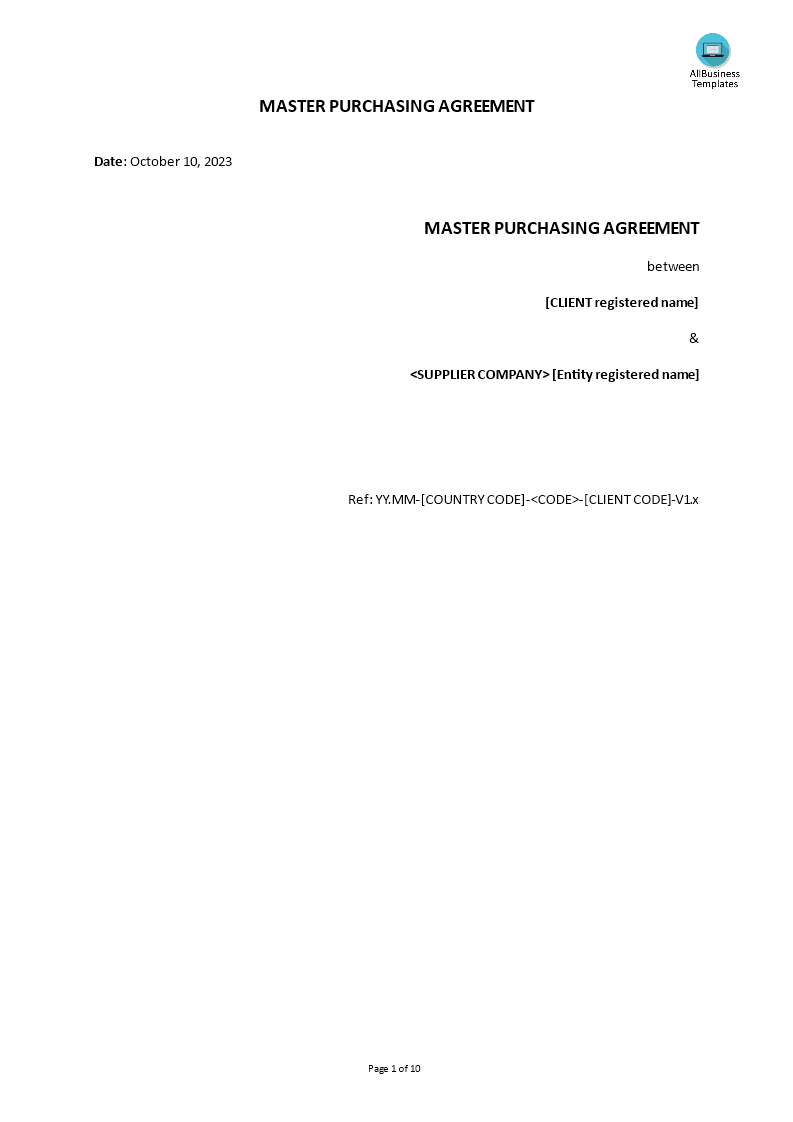Master Purchasing Agreement
Save, fill-In The Blanks, Print, Done!

Download Master Purchasing Agreement
Today: USD 3.95
Download It Now

Available premium file formats:
Microsoft Word (.docx)- This Document Has Been Certified by a Professional
- 100% customizable
- This is a digital download (36.89 kB)
- Language: English
- You will receive a link to download the file as soon as your payment goes through.
- We recommend downloading this file onto your computer.
How to draft a professional Master Purchasing Agreement? Why should you use a master purchase agreement? Our master purchase agreement template is comprehensive and legally binding. It covers all the important aspects of the agreement, including payment terms, delivery and return of items, and dispute resolution. Download this professional Master Purchasing Agreement template now!
Using this easy-to-modify Master Purchasing Agreement provides you with the best example Purchasing Agreement to give you a head start and more time to focus on important subjects in the arrangement.
A Master Purchasing Agreement (MPA), also known as a Master Procurement Agreement or Master Supply Agreement, is a legally binding contract between a buyer and a supplier that outlines the terms and conditions governing their ongoing business relationship for the purchase of goods or services. MPAs are commonly used in B2B (business-to-business) transactions, especially when the parties expect to engage in multiple transactions over an extended period.
Here are some key features and components of a Master Purchasing Agreement:
- Parties Involved: Clearly specify the legal entities or individuals entering into the agreement. This includes the buyer (often referred to as the "purchaser") and the supplier (sometimes referred to as the "vendor" or "seller").
- Scope of Agreement: Defines the scope of products, goods, or services covered by the agreement. This section may include detailed descriptions and specifications of the items to be supplied.
- Term and Termination: Specifies the duration of the agreement, which can be for a fixed term or ongoing until terminated. Terms and conditions for termination, including notice periods and reasons for termination, are also outlined.
- Pricing and Payment Terms: Details how prices for goods or services will be determined and any applicable pricing mechanisms (e.g., fixed prices, price adjustments based on market conditions). Payment terms, such as payment schedules, invoicing procedures, and any discounts or penalties, are also included.
- Delivery and Shipping: Describes the logistics and shipping terms, including delivery schedules, responsibilities for shipping costs, and terms for risk and title transfer.
- Quality and Performance Standards: Sets out quality and performance standards that the supplier must meet, along with procedures for inspections, testing, and quality control.
- Warranties and Liabilities: Outlines any warranties provided by the supplier, limitations of liability, and procedures for handling defective or non-conforming products or services.
- Confidentiality: Includes provisions for the protection of confidential information shared between the parties during the course of their business relationship.
- Intellectual Property: Addresses issues related to intellectual property rights, ownership of any intellectual property created during the performance of the agreement, and licensing if applicable.
- Dispute Resolution: Specifies mechanisms for resolving disputes between the parties, such as negotiation, mediation, or arbitration.
- Governing Law: States the governing law that will apply in case of legal disputes, often the laws of a specific jurisdiction.
- Amendments and Modifications: Explains how the agreement can be amended or modified and the process for doing so.
- Compliance with Laws and Regulations: Requires both parties to comply with all applicable laws, regulations, and industry standards.
- Insurance: May require one or both parties to maintain certain types and levels of insurance coverage.
- Indemnification: Addresses responsibilities for indemnifying the other party in case of losses, damages, or legal claims.
- Notices: Specifies the methods and addresses for official communication between the parties.
- Entire Agreement: States that the MPA constitutes the entire understanding between the parties, superseding any previous agreements or understandings.
MPAs provide a framework for a long-term business relationship, helping to streamline future transactions and reduce the need to negotiate terms for each purchase separately. However, they should be carefully drafted and reviewed by legal professionals to ensure that they protect the interests of both parties and comply with relevant laws and regulations.
Download this Master Purchasing Agreement template now and enhance your business!
Do you need more procurement templates? AllBusinessTemplates.com provides many kinds of legal and business templates in the range of IT, Environmental, Startups, Marketing, Sales, Procurement, Law, Notary, Finance, HR, Auction, Logistics, Transportation, Maintenance Services, etc. Just search on our website and have instant access to thousands of free and premium business document templates, forms, letters, reports, plans, resumes used by professionals in your industry. All business templates are easy to find, crafted by professionals, ready to use, easy to customize, and intuitive.
DISCLAIMER
Nothing on this site shall be considered legal advice and no attorney-client relationship is established.
Leave a Reply. If you have any questions or remarks, feel free to post them below.
Related templates
Latest templates
Latest topics
- Flyer Template
Creating strong marketing materials that support your marketing strategy, such as flyers or online promotion (banners, ads) are an important part of growing a successful business! - Hourly Weekly Schedule Template
How do I make an hourly schedule? Streamline your daily planning with our versatile hourly daily weekly schedule templates - Excel Templates
Where do I find templates for Excel? How do I create a template in Excel? Check these editable and printable Excel Templates and download them directly! - GDPR Compliance Templates
What do you need to become GDPR compliant? Are you looking for useful GDPR document templates to make you compliant? All these compliance documents will be available to download instantly... - Daily Report Sheets For Preschool
How do you create a kindergarten schedule or write a daily report for a preschool? Check out these preschool templates here.
cheese
